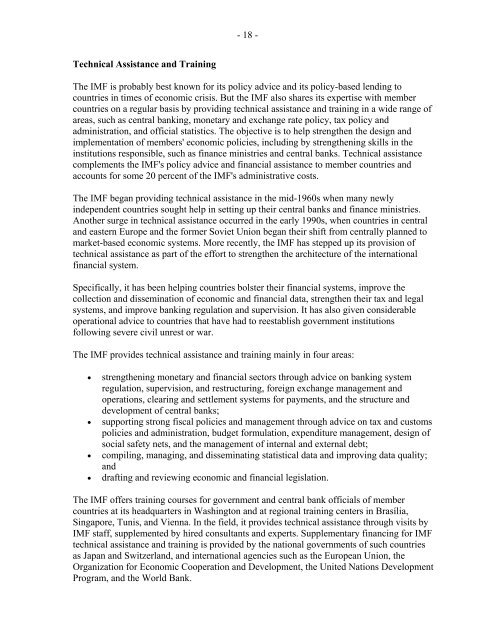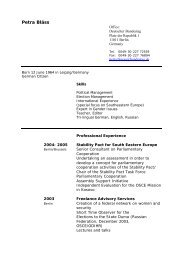What Is the International Monetary Fund? - the JVI eCampus!
What Is the International Monetary Fund? - the JVI eCampus!
What Is the International Monetary Fund? - the JVI eCampus!
Create successful ePaper yourself
Turn your PDF publications into a flip-book with our unique Google optimized e-Paper software.
Technical Assistance and Training<br />
- 18 -<br />
The IMF is probably best known for its policy advice and its policy-based lending to<br />
countries in times of economic crisis. But <strong>the</strong> IMF also shares its expertise with member<br />
countries on a regular basis by providing technical assistance and training in a wide range of<br />
areas, such as central banking, monetary and exchange rate policy, tax policy and<br />
administration, and official statistics. The objective is to help streng<strong>the</strong>n <strong>the</strong> design and<br />
implementation of members' economic policies, including by streng<strong>the</strong>ning skills in <strong>the</strong><br />
institutions responsible, such as finance ministries and central banks. Technical assistance<br />
complements <strong>the</strong> IMF's policy advice and financial assistance to member countries and<br />
accounts for some 20 percent of <strong>the</strong> IMF's administrative costs.<br />
The IMF began providing technical assistance in <strong>the</strong> mid-1960s when many newly<br />
independent countries sought help in setting up <strong>the</strong>ir central banks and finance ministries.<br />
Ano<strong>the</strong>r surge in technical assistance occurred in <strong>the</strong> early 1990s, when countries in central<br />
and eastern Europe and <strong>the</strong> former Soviet Union began <strong>the</strong>ir shift from centrally planned to<br />
market-based economic systems. More recently, <strong>the</strong> IMF has stepped up its provision of<br />
technical assistance as part of <strong>the</strong> effort to streng<strong>the</strong>n <strong>the</strong> architecture of <strong>the</strong> international<br />
financial system.<br />
Specifically, it has been helping countries bolster <strong>the</strong>ir financial systems, improve <strong>the</strong><br />
collection and dissemination of economic and financial data, streng<strong>the</strong>n <strong>the</strong>ir tax and legal<br />
systems, and improve banking regulation and supervision. It has also given considerable<br />
operational advice to countries that have had to reestablish government institutions<br />
following severe civil unrest or war.<br />
The IMF provides technical assistance and training mainly in four areas:<br />
• streng<strong>the</strong>ning monetary and financial sectors through advice on banking system<br />
regulation, supervision, and restructuring, foreign exchange management and<br />
operations, clearing and settlement systems for payments, and <strong>the</strong> structure and<br />
development of central banks;<br />
• supporting strong fiscal policies and management through advice on tax and customs<br />
policies and administration, budget formulation, expenditure management, design of<br />
social safety nets, and <strong>the</strong> management of internal and external debt;<br />
• compiling, managing, and disseminating statistical data and improving data quality;<br />
and<br />
• drafting and reviewing economic and financial legislation.<br />
The IMF offers training courses for government and central bank officials of member<br />
countries at its headquarters in Washington and at regional training centers in Brasília,<br />
Singapore, Tunis, and Vienna. In <strong>the</strong> field, it provides technical assistance through visits by<br />
IMF staff, supplemented by hired consultants and experts. Supplementary financing for IMF<br />
technical assistance and training is provided by <strong>the</strong> national governments of such countries<br />
as Japan and Switzerland, and international agencies such as <strong>the</strong> European Union, <strong>the</strong><br />
Organization for Economic Cooperation and Development, <strong>the</strong> United Nations Development<br />
Program, and <strong>the</strong> World Bank.



